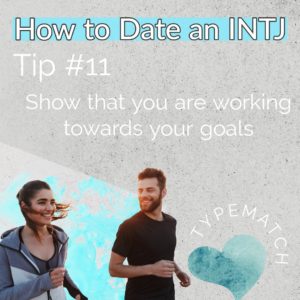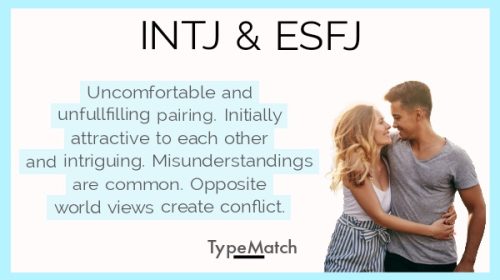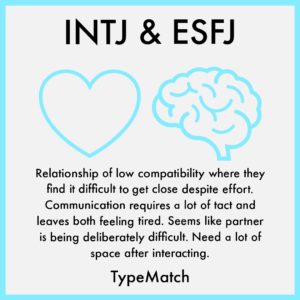INTJ and ESFJ Relationship
Are INTJ and ESFJ Relationships Compatible?
When it comes to personality type, INTJs and ESFJs are as opposite as can be. Unfortunately, in this case, these opposites rarely attract. INTJ and ESFJ relationships rank low in compatibility because of their vast differences.
Below, we outline what makes INTJs and ESFJs conflict and what makes this relationship pairing work.
Attraction
In an INTJ ESFJ relationship, psychological compatibility is low. However, this is not immediately obvious. The conflict partner often seems attractive because they show a high level of development in characteristics and style of thinking that the other is weak in.
Initially, while dating and maintaining some psychological distance, INTJs and ESFJs are often sympathetic to each other, admire each other’s strengths, discuss their interests, and exchange opinions. Partners may be attracted to each other initially because of their unusual abilities or beauty. They find each other mysterious and intriguing, like a puzzle they can’t solve. Later, they may be baffled by each other’s statements and behavior. Eventually, this may lead to open conflict.
Communication Compatibility
When INTJ and ESFJ couples communicate, they sometimes unintentionally get into debates. Each person might say something that hits the other person’s most painful area.
INTJs and ESFJs have opposite ways of viewing the world, processing information, and communicating. As a result they often completely misunderstand each other. What one views as important, the other views as pointless. Constantly, they undermine each other’s thoughts and feelings.
INTJ and ESFJ relationships usually require a lot of tact and understanding from both sides. They share a favorite minor function, leading to many arguments about topics they would instead not think or talk about. Their relationships are complicated, and the partners clash regularly. Whether it’s a matter of taste or opinion, it’s easy to get caught up in ensuring that their views are heard and respected. These two tend to want to prove their point to each other rather than listen to the other’s perspective. Basically, they talk at each other rather than with each other.
In groups, communication between the INTJ and ESFJ may be relieved by the presence of a person with a more compatible communication style. This allows one partner to be present and feel relieved from the conflict.
When it comes to dating and relationships, INTJs are notoriously hard to read and elusive. If you’re dating or trying to date an INTJ, download our guide with our top 20 pieces of practical advice for dating an INTJ. INTJ Dating Guide


INTJ and ESFJ Relationship
In INTJ and ESFJ relationships, they sometimes seem like they’re making progress with each other and become hopeful. However, suddenly one does or says something that completely sets them back and they don’t even know what they’ve done. For example, one person might say something that offends the other person’s vulnerable function. As a result, both people suffer. One might judge the other as too egotistical. Then the other partner judges the first as too shallow, foolish, or even malicious.
The two must make a great effort to be mindful of their distinctions and take care to avoid potential conflict. This keeps them from being able to relax and be themselves in the other’s presence. As a result, they become exhausted from the constant effort and inability to get close. Due to this, INTJs and ESFJs often lack a sense of security.
INTJs and ESFJs constantly face some inner tension, especially when transitioning to a more intimate relationship. The conflict is usually subdued, and the introvert may not express their feelings towards their partner until a breaking point is reached. Over time, the tension that arises from these conflicts can lead to bitterness. Even people around them often become anxious and irritable over time. In a family situation, INTJ and ESFJ relations can lead to psychosomatic illnesses, damaging one’s health.

Partnership
INTJ and ESFJ partnerships can be challenging. Over time, the tension from arguments and the constant desire to move away from each other causes resentment.
Such relationships are complex in personal life and work. It can be incredibly challenging when INTJs and ESFJs work together because their methods and rhythm of work are very different. The introvert might complain that extraverts don’t keep to schedules, thus wreaking havoc. In turn, the extravert might accuse the introvert of moving too slowly. However, when INTJs and ESFJs know personality type, they can divide work accordingly and not try to interfere with each other. For example, extroverts should not try to push and activate introverts; introverts should not try to slow down extraverts.
Misunderstandings often arise where there is a conflict of interest. It can be easy for people in this type of situation to think that the other person is being deliberately difficult. At the same time, these types of INTJ and ESFJ relationships can be deceiving. When faced with outside pressures, those in conflict can temporarily set aside their differences and work together. Overall, it’s important for each to remember that their partner brings their unique skills and perspectives to the table.

Our Advice for INTJs and ESFJs
Being in an INTJ and ESFJ relationship means being sensitive to their partner’s needs and interests and working together to resolve conflicts. For this pair, laughter and fun are often the best medicine. However, they must careful with their humor and avoid sarcasm. Once they feel that the tension has reached a critical point, leaving the area is usually best.
Rationalization will also help control internal nervousness and negative emotions so they can channel that energy into something productive or leisurely. One way to help fix this problem is to sit down with their partner and divide the duties between themselves. The two must have a firm schedule or plan to help keep things organized. They can do household duties together, but not take on the same task together. They should avoid surprises, fancies, and novelties, as their partner will likely react negatively to them.
An INTJ and ESFJ relationship without trust is like a house of cards. It’s built on a shaky foundation and can come crumbling down at any moment. To develop a connection to a solid foundation, they must start by being honest with their partner about their strengths and weaknesses. It is best to adhere to established traditions and communicate all changes beforehand to avoid this. Only by showing care and consideration for one another can this relationship be saved.
After evaluating different options and reasoning through various explanations, it has been shown that increasing the psychological distance between partners is the only way to improve relations.
More Resources for INTJ & ESFJ Relationships
Sources:
A.V. Bukalov, G. Boiko, “Why Saddam Hussein made a mistake, or what is Socionics”
Ekaterina Filatova “Art of understanding yourself and others”
Eugene Gorenko, Vladimir Tolstikov, “Nature of self”
I.D. Vaisband, publications on Socionics
Laima Stankevichyute “Intertype relations”
O.B. Slinko, “The key to heart – Socionics”
R.K. Sedih, “Informational psychoanalysis”
Sergei Ganin
Valentina Meged, Anatoly Ovcharov
V.V. Gulenko “Criteria of reciprocity”
V.V. Gulenko, A.V. Molodtsev, “Introduction to socionics”






